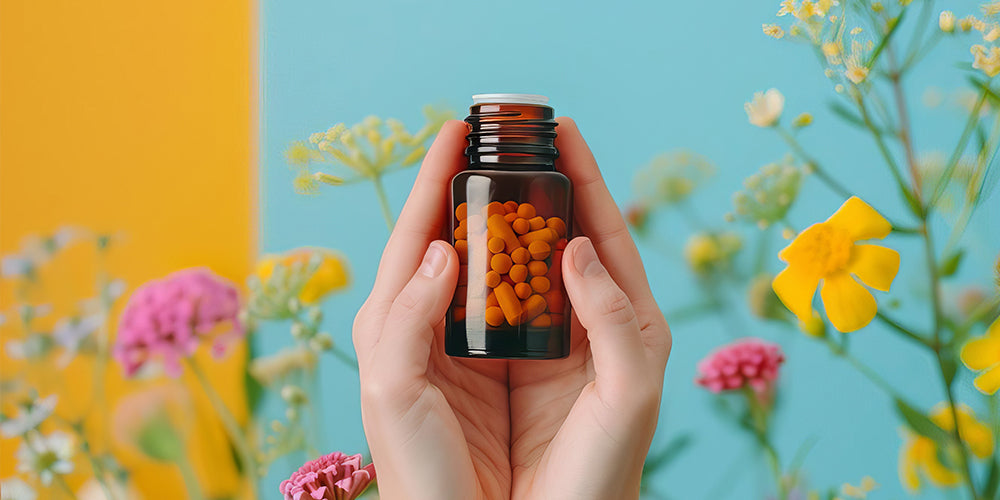A woman’s health and bodily functioning are a lot more complex than we think it is. With age and maturity, a woman’s nutritional needs evolve and fluctuate, leaving her with a new set of deficiencies, issues and changes to deal with. Compared to men, women have been known to have additional life processes to go through like menstruation, pregnancy and menopause and therefore have a diverse need of nutrients and vitamins that they require in specific amounts.
From adolescence to menopause, a woman not only changes physically but also mentally and emotionally, altering the connection between the mind and body too at every phase. Adding to the stressors and lifestyle changes we face in the modern age, having access to the right vitamins and nutrients becomes all the more essential. As women balance work, home, family and their personal commitments, we’re here to help them decide their nutritional needs in every phase of life.
UNDERSTANDING EVERY PHASE
From infancy, women’s bodies are going through multiple changes. As they are growing into adulthood, they require all growth-oriented foods and nutrients, but their needs become specific beyond adolescence and Middle Ages. To understand the news, we need to know the basal changes of every phase.
ADOLESCENCE
During adolescence, a girl starts developing primary and secondary sexual characteristics due to a rise in female hormones like oestrogen and progesterone. Her reproductive system becomes active as her body starts menstruating and is capable of carrying children. During this phase, her nutritional requirements are geared towards a healthy growth spurt, strengthening her reproductive system and overall health.
EARLY ADULTHOOD
This phase is between the ages of 16-25, during which her puberty comes to an end. Her career and life developments take precedence causing a rise in activity, stress and physical exercise. In this phase the emphasis switches to maintaining energy levels, supporting reproductive health and laying the groundwork for pregnancy.
PREGNANCY
During this time, a woman can rear a foetus in her body for 9 months, helping it develop and grow. With her reproductive system designed to carry a baby, this phase is particularly important as both the mother and baby’s growth is required. It greatly increases the need for specific nutrients that can reduce the risk of developmental issues or miscarriage. Here, the nutritional intake doubles so that the woman can carry the baby to term and heal postpartum.
MENOPAUSE
As the bookend to her reproductive health, menopause is a major change that women go through as their egg reserve starts declining. With a range of symptoms that accompany this change, menopause can take a toll on a woman’s body. The hormonal fluctuation can make way for other cardiovascular and skeletal issues, the nutritional needs are centred on managing these symptoms, promoting overall health and lowering the risk of diseases post-menopause.
Now that we’ve understood every phase, let’s dive deeper into the specific nutrients women should start taking in every phase.
VITAMINS REQUIRED DURING ADOLESCENCE
During adolescence, it's important for girls to get nutrients that support growth, immune function, and overall development:
Calcium
Essential for bone growth and development, helping to build strong bones and prevent osteoporosis in the future.
Vitamin D
Crucial for calcium absorption but also for oestrogen production for the development of women’s reproductive system.
Iron
Important for increasing blood volume and preventing anaemia, particularly during menstruation. It also aids energy production.
Vitamin A
Supports immune function, eye health, and skin integrity, playing a key role in overall growth and development.
During adolescence, women are at a higher risk of developing conditions like PCOS that can affect their fertility and reproductive health. If they do, they may also require research-backed supplements that can manage the symptoms with research-backed formulas with ingredients like Myo-Inositol.
VITAMINS REQUIRED DURING EARLY ADULTHOOD
During early adulthood, women should focus on nutrients that support energy levels, reproductive health, and overall well-being:
Folic Acid
Critical for women of childbearing age to reduce the risk of neural tube defects in babies and support overall reproductive health.
Vitamin B12
It is required for red blood cell production and maintaining the nervous system, which helps in energy metabolism and reducing fatigue.
Vitamin C
It functions as a potent antioxidant that helps protect cells from damage, supports the immune system, and is vital for skin health and collagen production.
Vitamin E
Acts as a powerful antioxidant that protects cells from oxidative stress, supports immune function, and aids in maintaining healthy skin.
It becomes essential for women to start adding natural multivitamins to their diet to cater to these needs and help them achieve optimal health.
NUTRIENTS REQUIRED DURING PREGNANCY

During pregnancy, specific nutrients become critical to sustain both the mother and the developing baby:
Folate (Folic Acid)
Essential for fetal development since it promotes healthy placental growth and prevents birth abnormalities in early stages.
Iron
Improves blood volume during pregnancy, prevents anemia, and promotes oxygen delivery to the fetus.
Calcium
Apart from maintaining the mother’s bone density to support pregnancy, calcium helps with the fetus’ bone and tooth growth.
Iodine
It is crucial for brain development and hormone synthesis, promoting neurological growth in babies.
NUTRIENTS NEEDED FOR MENOPAUSE AND BEYOND
As women reach menopause, focusing on specific nutrients can help manage symptoms, maintain bone density, and lower the risk of age-related illnesses like osteoporosis and cardiovascular disease.
Calcium
It is essential for maintaining bone density and preventing osteoporosis, which becomes more critical as estrogen levels decrease during menopause, causing issues with bone density.
Vitamin D
It improves calcium absorption and promotes bone health, while also boosting immune function and reducing inflammation during this phase.
Vitamin B6
Vitamin B6 helps alleviate depressive symptoms associated with menopause by promoting neurotransmitter signals and serotonin production in the brain.
Magnesium
Helps in muscle, bone, and well-being control thus helping in treating conditions such as muscle spasms and lack of sleep. Moreover, it helps to maintain healthy blood pressure levels essential to cardiovascular health.
Women may struggle to manage these symptoms on their own, but it can be brought under control by taking natural supplements that mimic oestrogen function to reduce the duration and intensity of symptoms like hot flashes, night sweats and irregular periods.
CONCLUSION
As women navigate their health and well-being in stressful times with busy lifestyles, it’s essential to know that their bodies go through larger, intense life changes. While every phase helps them change and become stronger in every way, it also comes with its set of challenges. With an added focus on understanding our ingredients and going clean with our food choices, women are now more aware and mindful of their eating habits to supplement their diet with important vitamins and nutrients. So, to stay at their healthiest and happiest version at any given age, you can start having targeted solutions in addition to lifestyle changes to thrive in every unique phase.















